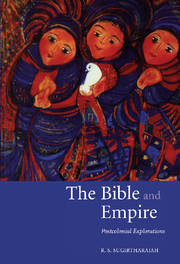Book contents
- Frontmatter
- Contents
- Acknowledgements
- Introduction
- 1 Textually conjoined twins: Rammohun Roy and Thomas Jefferson and their Bibles
- 2 Salvos from the Victorian pulpit: conscription of texts by Victorian preachers during the Indian rebellion of 1857
- 3 Thorns in the crown: the subversive and complicit hermeneutics of John Colenso of Natal and James Long of Bengal
- 4 Texts and Testament: the Hebrew scriptures in colonial context
- 5 Imperial fictions and biblical narratives: entertainment and exegesis in colonial novels
- Afterword
- Select bibliography
- Index of biblical references
- Index of names and subjects
3 - Thorns in the crown: the subversive and complicit hermeneutics of John Colenso of Natal and James Long of Bengal
Published online by Cambridge University Press: 02 December 2009
- Frontmatter
- Contents
- Acknowledgements
- Introduction
- 1 Textually conjoined twins: Rammohun Roy and Thomas Jefferson and their Bibles
- 2 Salvos from the Victorian pulpit: conscription of texts by Victorian preachers during the Indian rebellion of 1857
- 3 Thorns in the crown: the subversive and complicit hermeneutics of John Colenso of Natal and James Long of Bengal
- 4 Texts and Testament: the Hebrew scriptures in colonial context
- 5 Imperial fictions and biblical narratives: entertainment and exegesis in colonial novels
- Afterword
- Select bibliography
- Index of biblical references
- Index of names and subjects
Summary
The path of the critical Interpreter of Scripture is almost always a thorny one in England.
Benjamin JowettIt is the battle between sacred books and the direct eternal guidance of the Living God.
George W. CoxThis chapter is a follow-up to a promise I made in one of my earlier writings. While looking at the interpretative outputs of dissident Protestant missionaries like John Colenso, who proved to be awkward to the establishment but endeared himself to the colonized by taking up their grievances, I came across James Long (1814–87), in whose works I noted remarkable parallels with Colenso. To begin with, both sided with the oppressed – the Bengali indigo workers in the case of Long, and the Zulus in the case of Colenso. More remarkably, what was attractive to me was the way both of these Anglican missionaries marshalled and utilized the Bible for their Christian praxis. This chapter narrates and critiques their hermeneutical practices, and their often problematic entanglements with the colonial politics of the time.
At the outset, it should be said that in sheer volume of biblical work undertaken by these two missionary apostles Long is no match for Colenso. Colenso's output is enormous; his seven volumes on the Pentateuch run to more than five thousand pages, and the first volume went through several editions. Even more significantly, his work prompted a vigorous public debate. In today's world of academic star-rating, Long would have fared badly in the Research Assessment Exercise.
- Type
- Chapter
- Information
- The Bible and EmpirePostcolonial Explorations, pp. 98 - 144Publisher: Cambridge University PressPrint publication year: 2005



